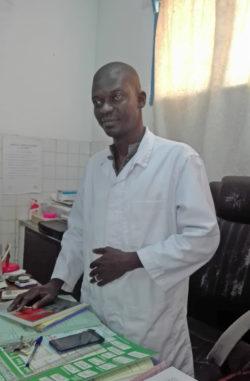Dr. Touré is the sole doctor at the medical center in Kouto, a rural community in northern Côte d’Ivoire. He lives over 440 miles from Abidjan and over 90 miles from the closest urban center (Korhogo) in the region most affected by the crises that Côte d’Ivoire experienced from 2002 to 2011. During that time, regional tensions rose and civil war erupted, with the country essentially splitting in two.
The north of the country now lags behind in access and quality of basic services (such as transportation, health, and education). As the senior medical professional at the Kouto clinic, Dr. Touré has the responsibility of treating patients that present a complicated medical picture, yet has few opportunities to update his skills. This affects the quality of his medical care, as he is very aware. In response to this, Dr. Touré enrolled in teleconsultation sessions provided through the “Telemedicine in Côte d’Ivoire” project.
Building bridges through technology
Telemedicine in Côte d’Ivoire—a partnership involving the Aga Khan Foundation, Industrial Promotion Services West Africa, and USAID—hosts teleconsultation sessions for doctors throughout the region to improve their knowledge of HIV/AIDS. The sessions focus on complex HIV cases, allowing doctors to present their cases and get feedback from specialists from the Tropical Infectious Diseases Department (TIDD), based in Abidjan.
Regarding his experience with the teleconsultation sessions, Dr. Touré said that he welcomes them “because it allows us [doctors] to meet and discuss… Also, [the specialists in Abidjan] have more experience in this area.”
Through the sessions, the doctors get real-time advice from experienced professionals, and at the same time, have an opportunity to build connections with likeminded peers. The creation of this network allows for the continuous exchange of best practices and innovations. Dr. Touré shared an example of how a small community of practice is already forming among the participants: “There is a session that we missed, due to connection issues, but we stayed in place and we discussed the cases amongst each other. The teleconsultation sessions give us a space to exchange and discuss with each other.”
Improving knowledge and tackling misconceptions
Côte d’Ivoire (along with Nigeria) has the highest rate of HIV/AIDs in West Africa. As of 2016, according to UNAIDS, nearly 3% of the Ivoirian population and 460,000 adults are affected by HIV/AIDS. Despite the disease being highly prevalent, misinformation and gaps in knowledge about the disease abound, even within the medical community.
Dr. Touré is beginning to build on his own medical knowledge through the teleconsultation program. When discussing the benefits of the project, he says, “We learned that often, HIV patients can suffer from other diseases besides HIV—specially, if they have been affected by HIV for a long time. With the medications, the patients can now live longer. Therefore, often other diseases can also affect them.”
During the teleconsultations sessions, doctors can clear their doubts about treatments for the disease and learn about the latest developments in HIV/AIDS care from high-level specialists.

Dr. Touré reflected on how having access to these teleconsultations could have helped him and his patients in the past.
He spoke of a previous situation, in which a patient developed an external mass on his neck. Dr. Touré thought it was an inflammation of the lymph nodes, so he started treating the patient for that diagnosis. When the patient showed no signs of progress, Dr. Touré sent him to Abidjan to get treated by specialists. The patient died before he could arrive to see the specialists. Only after his death did Dr. Touré realize the mass on his neck was actually a tumor. Dr. Touré wonders if the outcome would have been different if he had been able to discuss this directly with specialists in a teleconsultation while the patient was still under his care.
Enhancing patient care
Patients in Kouto are already feeling the effect of the teleconsultation sessions. As Dr. Touré explains it: “Before, we tried to take care of the difficult cases. But we had difficulties doing so. What we did, in general, was to send the patient somewhere else. With telemedicine, we bring the patient’s file, with all the references, and we discuss with the professors in Abidjan and, together, we try to find the solution, so that the patient can stay in his location.”
Telemedicine helps close the healthcare gap for patients and their families in remote and rural areas like Kouto. Patients, who would otherwise travel hours away, can receive quality treatment in their own communities, improving their overall quality of life. Healthcare providers like Dr. Touré can pass on the knowledge and techniques learned during the teleconsultations to their colleagues—expanding health services to more and more patients.
By the end of May 2018, a total of 165 complex HIV/AIDs cases have been presented during the teleconsultation sessions.
Melissa Salazar is Grants Associate with the Aga Khan Foundation in Côte d’Ivoire.